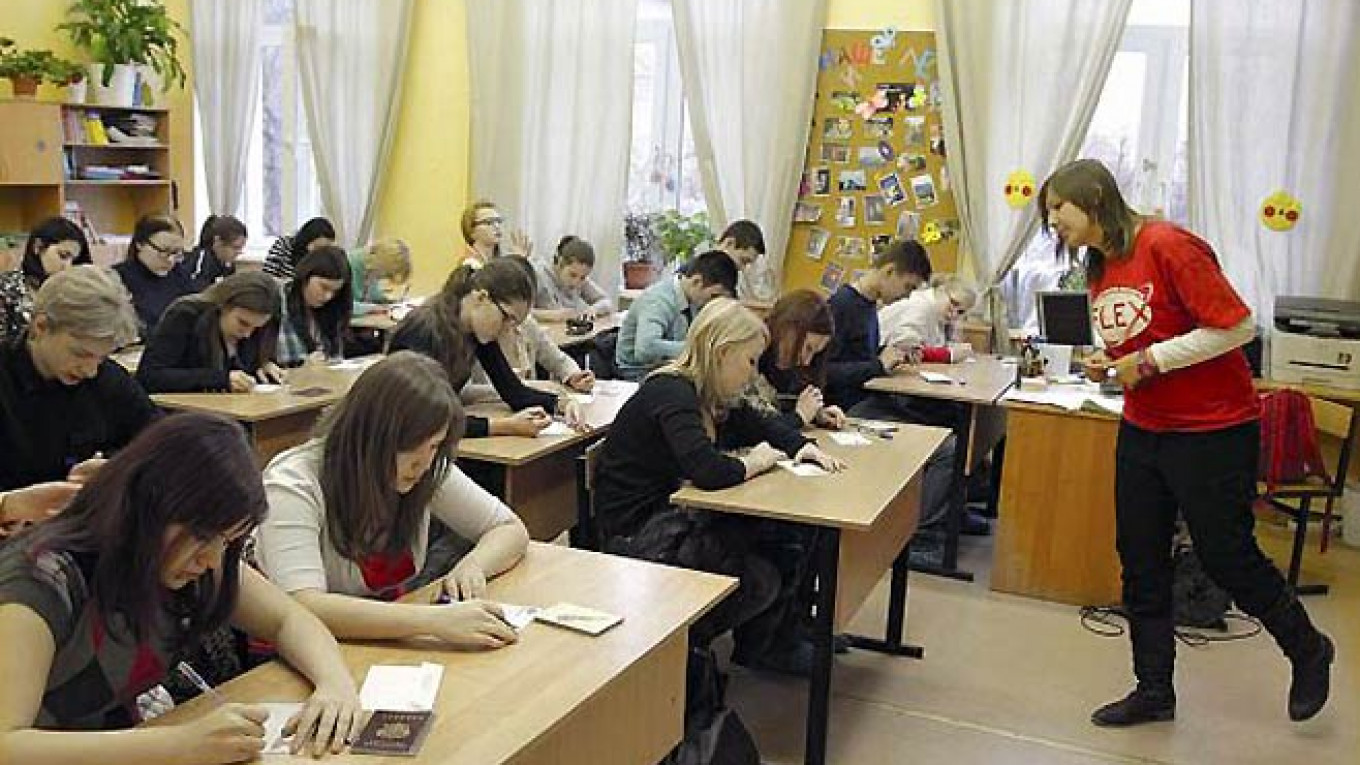Editor's note: For links to six articles from a related series, click here.
The Justice Ministry has ordered the Russian branch of American Councils, a U.S.-based nonprofit organization that administers student exchanges and other educational programs, to cease its operations indefinitely, in what appears to be part of an ongoing crackdown on NGOs funded by the U.S. and other foreign governments.
American Councils runs programs for both U.S. students in Russia and Russian high school and college students in the U.S. The action by the Justice Ministry apparently will not affect the programs for U.S. students but leaves the future of those for Russians, which include the FLEX program for Russian high schoolers, unclear.
Observers have linked American Councils' current situation to restrictive legislation on NGOs passed after President Vladimir Putin returned to the Kremlin in 2012.
"NGOs have been treated differently since Russia adopted its new legislation on nongovernmental organizations," Dr. David Patton, executive vice president of American Councils, said in a telephone interview from its head office in Washington, D.C.
The government move comes at the height of tensions between Russia and the U.S. and amid growing anti-American sentiment in Russia encouraged by state-run media and prominent politicians. The action also carries echoes of bans on other U.S. and foreign groups, including the U.S. Association for International Development in 2012 and the British Council in 2007.
In 2012, Russia tightened control over NGOs, adopting legislation that requires nongovernmental organizations to adopt the politically charged label "foreign agent" if they receive foreign funding and conduct "political" activity. That same year, Russia ordered USAID, which had been working in Russia since 1992, to cease its operations in the country, accusing it of using grants to influence Russian domestic politics and the country's elections and institutions.
On Monday, Putin told senior members of the Federal Security Service that Russia would not tolerate NGOs working toward "destructive purposes" while receiving funding from abroad.
Patton said that American Councils had been told it needed to re-register in order to continue operations and that the need to take this action had been discussed with the Russian authorities over the past year.
But this is the first time American Councils has had to halt its activities during its re-registration process. The organization, which has operated in Russia for 40 years, had last been re-registered in 2006.
The Justice Ministry said in a statement sent to The Moscow Times that American Councils had not properly registered its regional branches in accordance with the Russian law on non-commercial organizations. The ministry said it had issued American Councils a warning on Feb. 26, which gave the organization one month to rectify the supposed irregularities, but that the organization had failed to take the necessary actions.
The ministry also said that American Councils' activities went beyond its legal standing in the country and that it operated "practically like a corporation."
Carter Johnson, the director of the Russian branch of American Councils, said he could not speculate about the reasons behind the Justice Ministry's actions, but he said that he remained optimistic that the move would cause only a temporary disruption of the organization's activities in Russia.
"We are currently gathering the necessary documents to re-register," Johnson said in a telephone interview. "We expect this process to take two months. We have to cease our operations until we are re-registered, but we expect to be up and running again in the near future."
One former American Councils employee who worked at the Moscow office several years ago said he was not surprised by the ministry's decision to halt the organization's activities.
"It's the type of thing they were always threatening to do," the former employee said, referring to the Russian authorities. The former employee asked to remain anonymous in order to preserve professional relationships.
The U.S. Embassy in Moscow, which has ties with American Councils because the U.S. State Department is among the organization's funders, declined to comment on the situation when contacted on Thursday.
American Councils administers more than a dozen educational programs in the U.S. and Russia, ranging from language training to academic and cultural exchanges. In 2013, roughly 1,800 people participated in American Councils programs in both countries, with about 1,200 Russian participants and 600 from the U.S.
Many of the programs have extensive alumni networks, which American Councils helps maintain. The FLEX program alone, which organizes exchanges for high school students from Russia and the former Soviet Union, has had more than 23,000 participants since 1993.
Worldwide, American Councils administers 250 programs in more than 60 countries and has more than 50,000 alumni. It employs more than 450 people internationally and operates with a $86 million dollar budget for the 2013-2014 fiscal year.
According to both Patton and Johnson, Russian and American universities should not be affected by the temporary cessation of the organization's operations. But the fate of the FLEX program remains unclear in light of the new circumstances.
The organization was informed of the Justice Ministry decision on Monday, and no deadline has been set for the cessation of its activities in Russia. But the organization's dozens of employees have already begun winding down some of its operations, including at its seven EducationUSA centers across Russia, which operate to inform Russian students about education opportunities in the U.S. and host events with American speakers.
When contacted by telephone, an employee at one of the centers said that her office was "packing up."
The employee also expressed concern about how the moratorium on operations would impact her livelihood.
"It's still not clear what will happen during this break," said the employee, who requested anonymity because she was not authorized to speak to the media. "We haven't been informed about what will happen with our pay."
American Councils said it had ensured that its Russian employees would be compensated in accordance with Russian labor law during the cessation of its activities.
The organization is currently in the process of determining how to proceed with its non-Russian employees.
Contact the author at g.tetraultfarber@imedia.ru
A Message from The Moscow Times:
Dear readers,
We are facing unprecedented challenges. Russia's Prosecutor General's Office has designated The Moscow Times as an "undesirable" organization, criminalizing our work and putting our staff at risk of prosecution. This follows our earlier unjust labeling as a "foreign agent."
These actions are direct attempts to silence independent journalism in Russia. The authorities claim our work "discredits the decisions of the Russian leadership." We see things differently: we strive to provide accurate, unbiased reporting on Russia.
We, the journalists of The Moscow Times, refuse to be silenced. But to continue our work, we need your help.
Your support, no matter how small, makes a world of difference. If you can, please support us monthly starting from just $2. It's quick to set up, and every contribution makes a significant impact.
By supporting The Moscow Times, you're defending open, independent journalism in the face of repression. Thank you for standing with us.
Remind me later.






